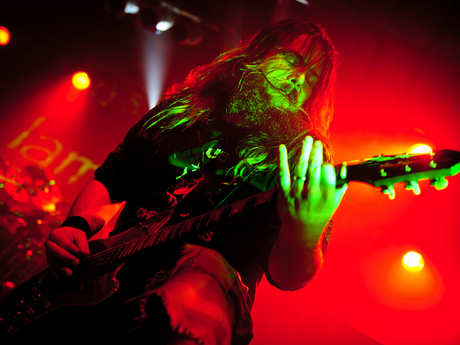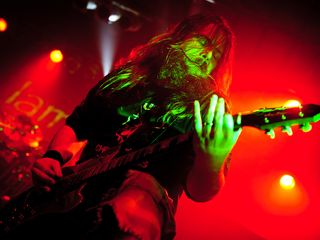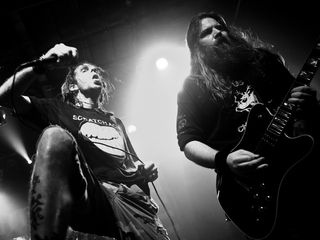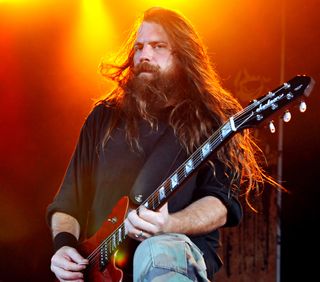

Mark Morton, on stage with Lamb Of God, with his Jackson Signature Dominion guitar. © Igor Vidyashev/ZUMA Press/Corbis
"It's very flattering to hear what is being said about us," says Lamb Of God guitarist Mark Morton. "I don't know if I personally see this year as being different from any other year. Still, it's nice to know that people really like this album. It's connecting, and that's good, of course."
The album Morton refers to is Resolution, the Richmond, Virginia-based quintet's seventh offering, which has just stormed its way onto the charts. A dazzling, sophisticated blend of thrash aggression and classic metal precision, its 14 cuts unfold as a seamless, collective whole, and has already been compared to landmark works by the likes of Metallica, Iron Maiden and Pantera.
Every so often, a metal band claims the title of 'the biggest' or 'the best,' and this year Lamb Of God (who also include singer Randy Blythe, bassist John Campbell, along with brothers Chris and Willie Adler on drums and guitar, respectively) are being hailed genre groundbreakers.
"What might be coming through on this album is the fact that we're more comfortable in our own skin," says Morton, responding to industry and internet chatter. "Over the course of our discography, we've learned a lot and tried some things. On the whole, I'd say that we feel secure in our identity. We're confident about our abilities, so that's where everything might be coming from."
MusicRadar sat down with Mark Morton to discuss the making of Resolution, his approach to guitar playing and recording, along with his thoughts on how the internet affects the way music is marketed.
Does ego ever come into play with Lamb Of God? Being called 'the biggest' and 'the best' is part of a musical tradition. And not just in metal - The Rolling Stones bill themselves as 'the greatest rock 'n' band in the world.'
Get the MusicRadar Newsletter
Want all the hottest music and gear news, reviews, deals, features and more, direct to your inbox? Sign up here.
"Yeah. I don't know how that fits in with us. We don't walk around saying, 'We're the best.' We strive to get better, sure, and we definitely try to make the best albums we can and put on the best shows we can. I'm not sure if it's ego-driven, though. I think it's more about wanting to enjoy what we do and challenge ourselves creatively and technically.
"There some other metal bands that are bigger than us. Metallica, certainly, is the biggest in the world; Slipknot's a very big band, too. Do I feel that I'm in direct competition with them? Not really - because they do things musically that are very different from Lamb Of God. We respect them, we've worked with them, and that's where it sits."
Aside from making a great record, did you have a specific goal in mind when cutting Resolution?
"I think, more than ever before, we had a free-form approach. The past few records have been a little... reactionary. Ashes Of The Wake was kind of rushed because we had just gotten our major label deal - the label invested in us and wanted their own record out fast, so we put that out quickly.
"Sacrament was a reaction to that. We took our time and had our first heavily produced record. Next we reacted to that record and stripped away all of that production and layering - we made a very live-sounding record with Wrath. That stream of records was us responding to what we had just done.
"That wasn't the case with Resolution. We resolved all of that - the title kind of plays on that. This time, we were very free and open. There were no anxieties about what we should or shouldn't try. If it sounded right and felt right, that's what we did."

On stage in Toronto with singer Randy Blythe (left). © Igor Vidyashev/ZUMA Press/Corbis
What bothers you about the current state of metal?
"I don't spend a lot of time yearning for the old days, but one thing that bothers me is… well, it's the internet. A certain amount of excitement has gotten lost about music, and it's because of the internet, really.
"Look, I'm on the internet every day just like everybody else - if you have electricity, you're on the internet. But I don't like how it's spoiled some of the fun of a new record coming out. I remember, when I was younger, I would wait and wait for that new Slayer record or that new Testament record. And when it did come out, I'd have to drive with my friends 30 or 40 minutes to a record store to get it. It was a big deal. There was a lot of joy when you finally got that record.
"That's lost now. When a band is putting out a record, they leak tracks for weeks and even a month beforehand. It makes records seem not as special, especially when you hear these bad-quality leaks. It's a shame. I do miss how it used to be."
Is there anything you can do as a band to combat that, or at least do things differently?
"I don't think so. No, not really. I think if there was a different way, somebody would have done it by now. We try to make our album packages special, and we try to put out different versions. It's not for commercial reasons, it's just because we value what we do."
Your singer, Randy Blythe, recently criticized digital recording and 'technically perfect' albums. He said they were making bands disappear. Do you share his feelings?
"Yeah, a little bit. I think that the way people make records nowadays, especially in metal, there's a lot of cutting and pasting going on. It makes records sound the same, very sterile. Pro Tools and Logic are wonderful things, but they can make for lifeless records. We'll consciously choose takes that aren't perfect, because we want some life in our music."
So if you could go back to analogue, would you?
"No, I don't think so. I think that even if you record analogue, it's going to be converted to digital anyway. I do have a lot of vinyl, though, and I think that vinyl records on a good turntable sound better than music delivered on any other form."
You're not strictly a metal player - you have some very distinct blues leanings. Do some licks or riffs ever get nixed by the band as being 'not metal enough'?
"Certainly not in a lead context. There have been times when I've brought in song ideas and they'll be questioned collectively whether they're right for the band. Usually, we find a way to make things work.
"There's a song on the new record called To The End, and it's a real ZZ Top/Just Got Paid kind of reference. What's funny is, once we did a few passes at it, I was the one who said, 'What do you think, guys? Can we get away with this?' [laughs] But you have to take risks; you have to try new things."
How did you go about writing the riffs for the new record? Do you have any kind of process?
"I just pick up the guitar! [laughs] That's it, really. I sit and I play and I see what comes out. I don't have an approach. I don't play every day - I'd be lying if I said I did - but I play most days. When something cool comes up, I know I should build on it. I do record to programs on my laptop, and that makes it easy to document my ideas."

Hair + metal: Morton shredding in Cincinnati, OH, 2010. © Amy Harris/Corbis
Let's talk about some of the new songs. Ghost Walking recalls the vibe of Redneck [from 2006's Sacrament] somewhat - you go from blues to some really crazed metal shredding.
"I've heard that lately, but I didn't think of those terms while we were doing it. Most of the blues influence comes from classic rock, a lot of the British blues guys: Keith Richards, Jimmy Page and a little bit of Peter Green. And Jimi Hendrix - I could make a strong argument that Hendrix is a British blues player. [laughs] They discovered him before we did. But there's also Southern rock guys like Gary Rossington and Billy Gibbons.
"Lots of great players weave the blues into heavy music. Certainly Zakk Wylde and Vivian Campbell. I think I take it all in and it comes out."
Cheated is pretty punk rock. Did punk inform your guitar playing?
"Sure. There were some great punk guitarists, most immediately Dr Know from Bad Brains - he's a great player from the riff side. I think our whole band has a strong punk influence."
Insurrection has a very intense drum groove - how do you work out what you're playing to what Chris is doing? Do you ever make him change what he's playing to fit your riffs?
"Really, the guitar parts come first, so Chris invariably plays to what we're doing instead of the other way around. Quite often, Willie and I will have a pattern and we have an idea of where the snare should fall. Most of my directions to Chris involve just that - where to put the snare.
"Whether it's a groove thing, or if it's up-time, double-time, cut-time or that stuff, I'll have ideas. What Chris does with his feet or his fills, that's up to him. I'm certainly not going to tell him what to play. He's a great drummer and I'm not." [laughs]
Desolation is based on a low E-string riff. Do you find that you go to the E-string a lot when writing?
"I do go to that top string a lot, sure. For Desolation, it's tuned to C# - a lot of the songs are in C#. I've been criticized online lately for using the top string for riffs, but for me it's a tonal thing. Yeah, you could play that riff on any of the top strings if you want to minimize the position changes. But I like the way that string resonates - it's very rich. I like the way that string responds, so it's a tension thing."
What were your main guitars for recording?
"I used my Jackson signature Dominions, and for the rhythms I primarily used my Les Paul Goldtop. For most of the lead stuff, I used a Jackson Soloist. And I used a Telecaster for the clean, arpeggiated intro on King Me. Let's see, there was a Les Paul Junior, and I also used a Guild D5 for the acoustic stuff."
Finally, let's talk solos. Visitation has a very striking, classic-metal solo. What's your criteria for creating the kind of lead spot you want to hear?
"I try to treat solos as being mini songs within the songs. If they can be their own composition, building and peaking and resolving, then I've done my job. If I don't hear anything, I won't do it. A solo should be exciting and definitely add something important musically. Showing off my chops a little bit, yeah, there's a little bit of that. [laughs] But I like to be spontaneous. On this album, I sketched things out, but in the end, the solos were very spontaneous."
Read what Mark has to say about his live guitars here
Joe is a freelance journalist who has, over the past few decades, interviewed hundreds of guitarists for Guitar World, Guitar Player, MusicRadar and Classic Rock. He is also a former editor of Guitar World, contributing writer for Guitar Aficionado and VP of A&R for Island Records. He’s an enthusiastic guitarist, but he’s nowhere near the likes of the people he interviews. Surprisingly, his skills are more suited to the drums. If you need a drummer for your Beatles tribute band, look him up.

“I should have been dead that night!”: Former Kiss guitarist Ace Frehley recalls the moment he almost died on stage
![Orianthi [left] wears a wide-brimmed hat and sunglasses as she takes a solo on her signature PRS electric guitar; Michael Jackson wears mirrored shades and a gold bullet-belt as he performs at the half-time Super Bowl show in 1993.](https://vanilla.futurecdn.net/cyclingnews/media/img/missing-image.svg)
“He was such a perfectionist, attention to detail, every part”: Orianthi on what she learned from Michael Jackson and how the King of Pop was so exacting he even directed her guitar tone
Most Popular








